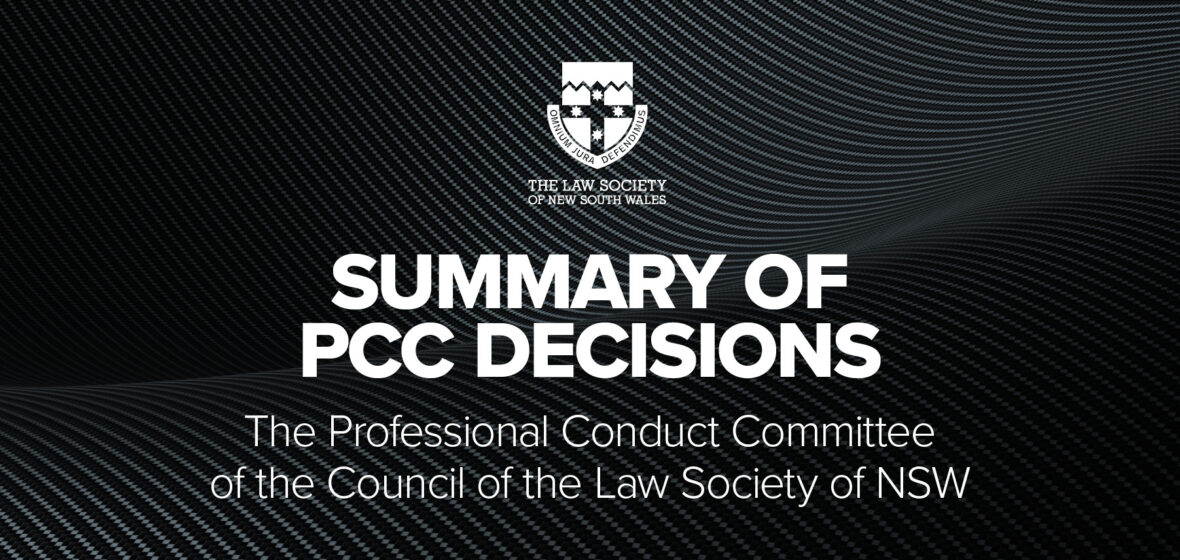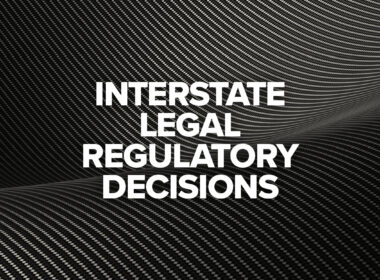The Professional Conduct Committee (PCC) of the Council of the Law Society of NSW (Council), under delegation from the NSW Legal Services Commissioner (Commissioner) and the Council, deals with complaints referred to the Council by the Commissioner. A total of 218 matters were finalised during the July to September quarter.
In this quarter, the PCC determined 4 matters that warranted a finding of unsatisfactory professional conduct and referred 6 matters to the NSW Civil and Administrative Tribunal pursuant to s 300 of the Legal Profession Uniform Law (NSW) (Uniform Law). These matters involved the following conduct issues:
- purporting to act on behalf of a client when the solicitor did not have instructions;
- submitting information to NSW Land Registry Services which the solicitor knew or ought reasonably to have known was false;
- breaching r 14 of the Legal Profession Uniform Law Australian Solicitors’ Conduct Rules 2015 (Conduct Rules) by failing to return client documents in a timely manner;
- representing to a third party that a client’s mental capacity was intact when this was not the case; and
- dishonest behaviour towards a barrister and the NSW Bar Association in connection with the status of litigation and the payment of fees.
- Misappropriation of trust funds.
- Failing to comply with multiple undertakings.
- Conflicts of interest by acting for a client in circumstances where the solicitor was also a creditor/mortgagee.
Submitting false information to NSW Land Registry Services
One matter considered by the PCC this quarter related to a solicitor lodging a withdrawal of caveat for a client, in circumstances where they did not have authority to do so.
By lodging a withdrawal of caveat in the absence of authority from their client, the actions of the solicitor resulted in them purporting to act on their client’s behalf without instructions and submitting information to NSW Land Registry Services, which the solicitor knew or ought to have known was false.
The PCC considered this conduct in the context of the standard of conduct prescribed in ss. 296 and 297 of the Uniform Law.
The Queensland Civil and Administrative Tribunal in the matter of Legal Services Commissioner v Laylee and Anor [2016] QCAT 237 (at [43] per Justice DG Thomas) stated the test required to establish unsatisfactory professional conduct as follows:
“The test required to determine whether conduct is unsatisfactory conduct is such that the relevant ‘falling short’ does not embrace all cases of error but must be sufficiently substantial. There must be an appreciable departure from the standard for the conduct to be unsatisfactory professional conduct. An isolated instance, not involving unethical conduct, and more in the nature of conduct which might give rise to an assertion of negligence, is less likely to amount to unsatisfactory professional conduct. Serious, or repeated instances, are more likely to amount to unsatisfactory professional conduct or professional misconduct.”
The PCC considered that in this type of matter, there was an expectation that there would be a costs agreement, file notes and other supporting documentation referred to in the certification to NSW Land Registry Services.
The certification is required as part of the e-Conveyancing process and requires that the subscriber certify that:
- They have taken reasonable steps to ensure that the Registry Instrument or Document is correct and compliant with the relevant legislation and any Prescribed Requirement.
- They have retained the evidence supporting the Registry Instrument or Document.
- They hold a properly completed Client Authorisation of the Conveyancing Transaction including the Registry Instrument or Document.
- They have taken reasonable steps to verify the identity of the caveator.
The solicitor had none of these documents, leading the PCC to form the view that the conduct reflected an appreciable departure from the standard expected of a reasonably competent solicitor.
The PCC determined that the solicitor be reprimanded and undertake and complete an ethics and regulatory compliance course.
Failure to comply with Rule 14 of the Conduct Rules
In one of the matters considered by the PCC the executors of an estate requested the deceased’s file from the relevant solicitor. The solicitor failed to provide the file to the executors notwithstanding numerous requests to do so.
Rule 14 of the Conduct Rules requires that a solicitor with designated responsibility for a client’s matter must ensure that upon completion or termination of the engagement that the client (or former client) or a person authorised by the client, is given any client documents as soon as reasonably possible when requested to do so.
The executors ultimately sought a court order requiring the solicitor to provide the client documents to them. The PCC found the solicitor had engaged in unsatisfactory professional conduct and reprimanded the solicitor on the basis that their actions, in not providing the client documents, and their correspondence fell below the standards of competence and diligence that a member of the public was entitled to expect.
Dishonest conduct
Dishonest conduct is a common theme considered by the PCC. In this matter, the solicitor had provided their client with an incorrect update concerning the status of litigation. Further, the solicitor proceeded to inform the NSW Bar Association that at no time had they accepted personal liability for Counsel’s fees. Both the update and the statement to the NSW Bar Association were incorrect and the solicitor knew that the statements were incorrect.
Solicitors must be conscious of the responsibilities they owe to the Court, their clients, the profession and the general public. In particular, as Justice Spigelman stated in New South Wales Bar Association v Cummins [2001] NSWCA 284:
“Honesty and integrity are important in many spheres of conduct. However, in some spheres significant public interests are involved in the conduct of particular persons and the state regulates and restricts those who are entitled to engage in those activities and acquire the privileges associated with a particular status. The legal profession has long required the highest standards of integrity.”
The PCC found that the solicitor had engaged in unsatisfactory professional conduct, reprimanded the solicitor, issued the solicitor with a fine of $5,000 and required that the solicitor complete an ethics course.
Misleading statements regarding client’s capacity
The PCC considered a matter pursuant to which a solicitor advised a costs assessor that the Court had found that there were no concerns regarding the solicitor’s client’s capacity, when the Court had not in fact made such a finding. The PCC found that that the solicitor had made the aforementioned statement to the costs assessor for the purposes of having a costs assessment stayed and that the statement made to the costs assessor was inaccurate and misleading.
The PCC considered that the solicitor had engaged in unsatisfactory professional conduct and was cautioned.




